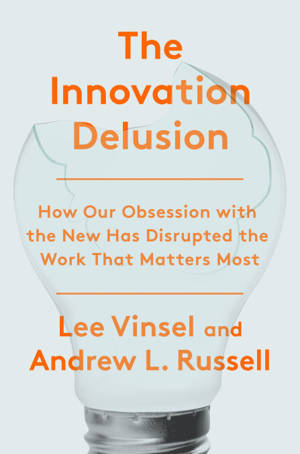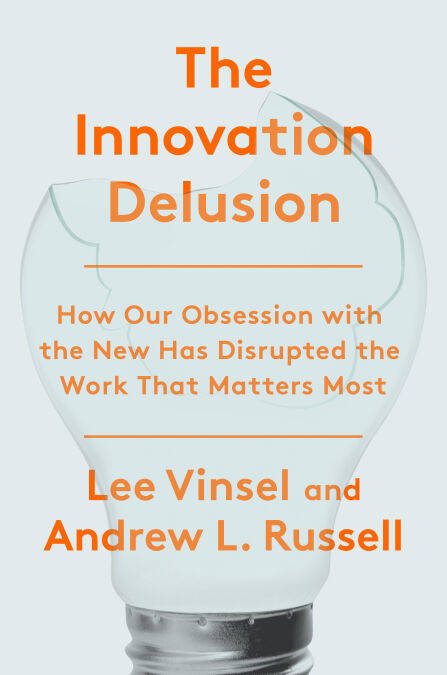
- Retrait gratuit dans votre magasin Club
- 7.000.000 titres dans notre catalogue
- Payer en toute sécurité
- Toujours un magasin près de chez vous
- Retrait gratuit dans votre magasin Club
- 7.000.0000 titres dans notre catalogue
- Payer en toute sécurité
- Toujours un magasin près de chez vous
The Innovation Delusion EBOOK
How Our Obsession with the New Has Disrupted the Work That Matters Most
Lee Vinsel, Andrew L. Russell
Ebook | Anglais
5,98 €
+ 5 points
Format
Description
“Innovation” is the hottest buzzword in business. But what if our obsession with finding the next big thing has distracted us from the work that matters most?
“The most important book I’ve read in a long time . . . It explains so much about what is wrong with our technology, our economy, and the world, and gives a simple recipe for how to fix it: Focus on understanding what it takes for your products and services to last.”—Tim O’Reilly, founder of O’Reilly Media
It’s hard to avoid innovation these days. Nearly every product gets marketed as being disruptive, whether it’s genuinely a new invention or just a new toothbrush. But in this manifesto on thestate of American work, historians of technology Lee Vinsel and Andrew L. Russell argue that our way of thinking about and pursuing innovation has made us poorer, less safe, and—ironically—less innovative.
Drawing on years of original research and reporting, The Innovation Delusion shows how the ideology of change for its own sake has proved a disaster. Corporations have spent millions hiring chief innovation officers while their core businesses tank. Computer science programs have drilled their students on programming and design, even though theoverwhelming majority of jobs are in IT and maintenance. In countless cities, suburban sprawl has left local governments with loads of deferred repairs that they can’t afford to fix. And sometimes innovation even kills—like in 2018 when a Miami bridge hailed for its innovative design collapsed onto a highway and killed six people.
In this provocative, deeply researched book, Vinsel and Russell tell the story of how we devalued the work that underpins modern life—and, in doing so, wrecked our economy and public infrastructure while lining the pockets of consultants who combine the ego of Silicon Valley with the worst of Wall Street’s greed. The authors offer a compelling plan for how we can shift our focus away from the pursuit of growth at all costs, and back toward neglected activities like maintenance, care, and upkeep.
For anyone concerned by the crumbling state of our roads and bridges or the direction our economy is headed, The Innovation Delusion is a deeply necessary reevaluation of a trend we can still disrupt.
“The most important book I’ve read in a long time . . . It explains so much about what is wrong with our technology, our economy, and the world, and gives a simple recipe for how to fix it: Focus on understanding what it takes for your products and services to last.”—Tim O’Reilly, founder of O’Reilly Media
It’s hard to avoid innovation these days. Nearly every product gets marketed as being disruptive, whether it’s genuinely a new invention or just a new toothbrush. But in this manifesto on thestate of American work, historians of technology Lee Vinsel and Andrew L. Russell argue that our way of thinking about and pursuing innovation has made us poorer, less safe, and—ironically—less innovative.
Drawing on years of original research and reporting, The Innovation Delusion shows how the ideology of change for its own sake has proved a disaster. Corporations have spent millions hiring chief innovation officers while their core businesses tank. Computer science programs have drilled their students on programming and design, even though theoverwhelming majority of jobs are in IT and maintenance. In countless cities, suburban sprawl has left local governments with loads of deferred repairs that they can’t afford to fix. And sometimes innovation even kills—like in 2018 when a Miami bridge hailed for its innovative design collapsed onto a highway and killed six people.
In this provocative, deeply researched book, Vinsel and Russell tell the story of how we devalued the work that underpins modern life—and, in doing so, wrecked our economy and public infrastructure while lining the pockets of consultants who combine the ego of Silicon Valley with the worst of Wall Street’s greed. The authors offer a compelling plan for how we can shift our focus away from the pursuit of growth at all costs, and back toward neglected activities like maintenance, care, and upkeep.
For anyone concerned by the crumbling state of our roads and bridges or the direction our economy is headed, The Innovation Delusion is a deeply necessary reevaluation of a trend we can still disrupt.
Spécifications
Parties prenantes
- Auteur(s) :
- Editeur:
Contenu
- Nombre de pages :
- 272
- Langue:
- Anglais
Caractéristiques
- EAN:
- 9780525575696
- Date de parution :
- 07-09-20
- Format:
- Ebook
- Protection digitale:
- Adobe DRM
- Format numérique:
- ePub

Les avis
Nous publions uniquement les avis qui respectent les conditions requises. Consultez nos conditions pour les avis.






